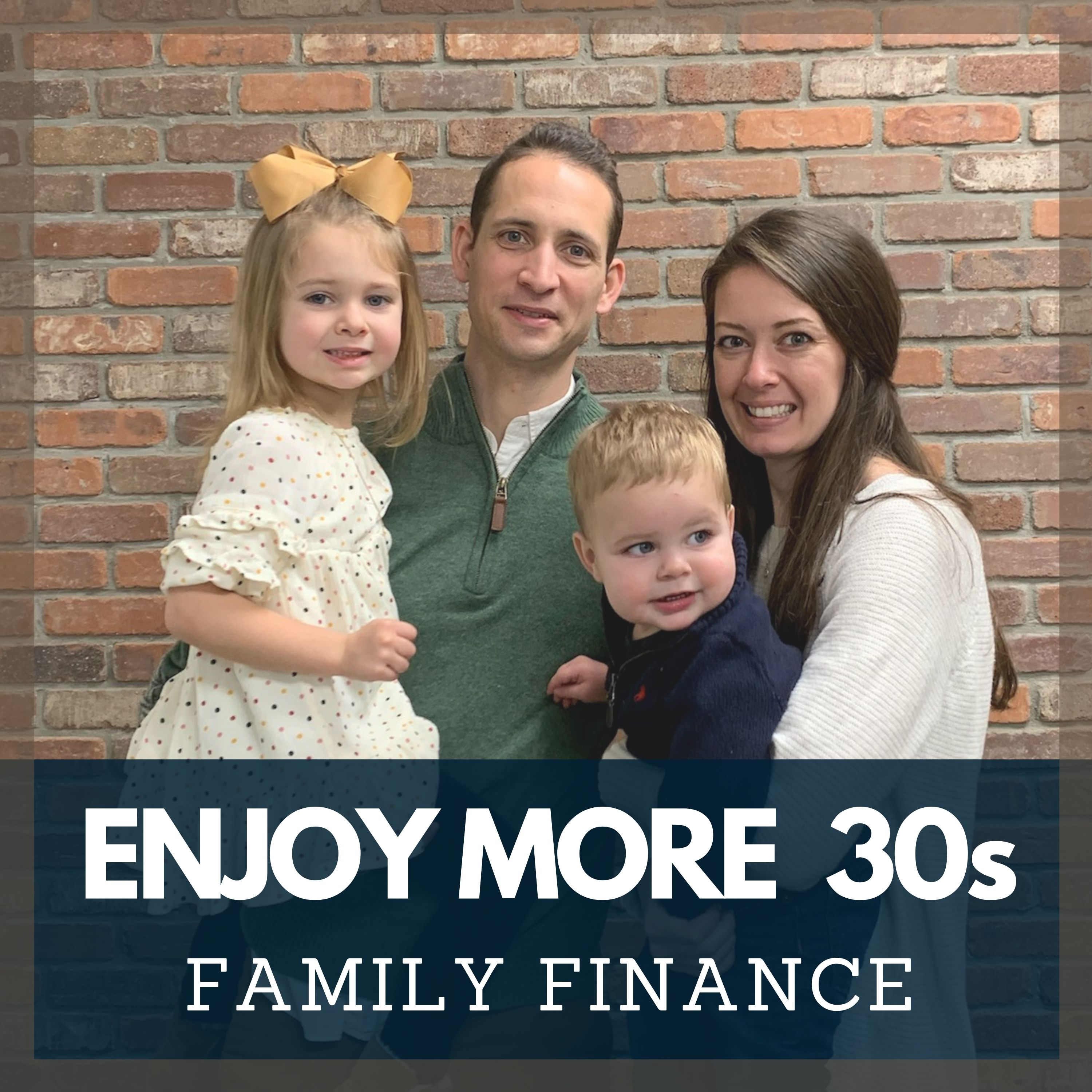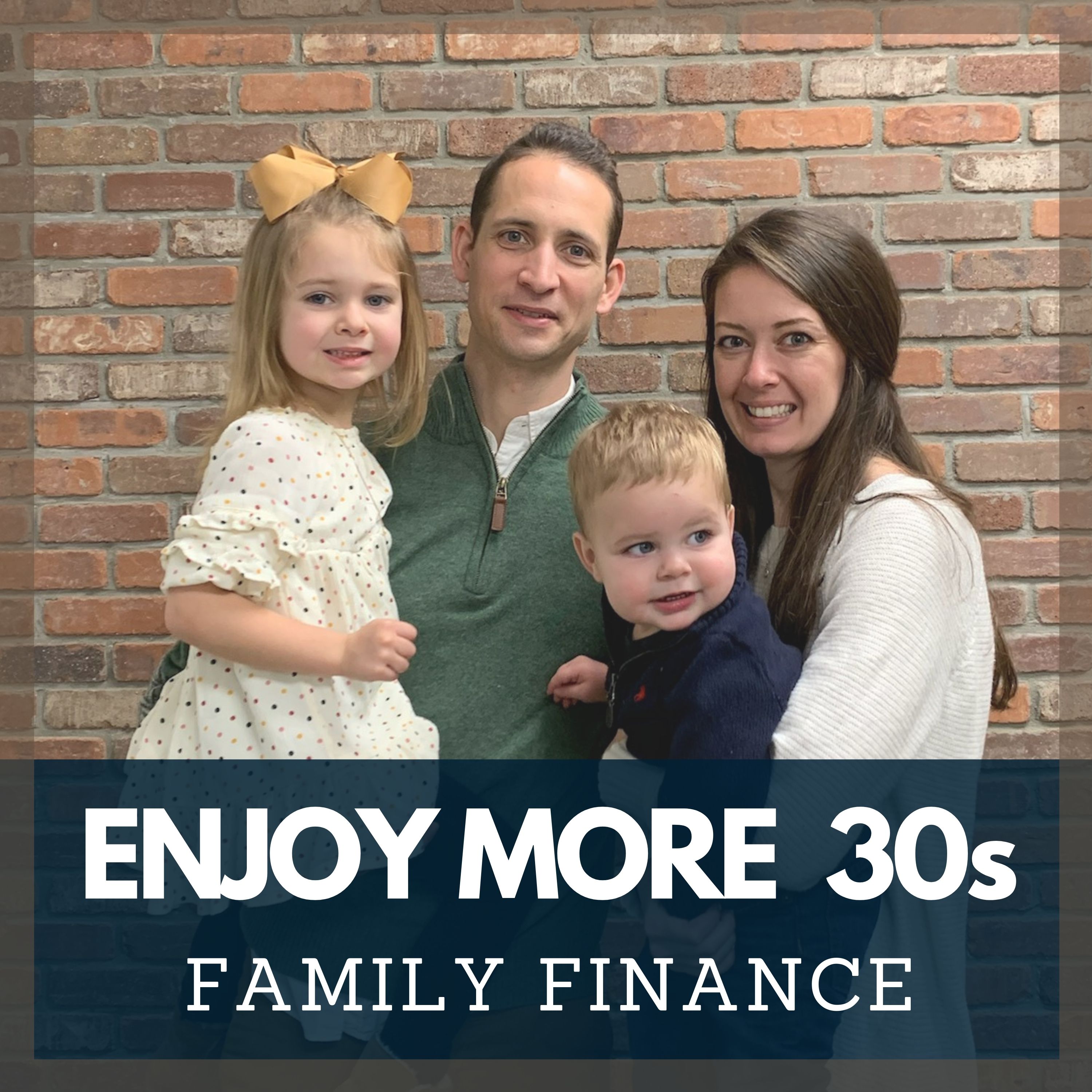Episode 2
Like Super Gymnast Flexible | Series 1.2
Create a Flexible Financial Situation for Your Changing Life
Quote for the episode: "Being flexible when it comes to personal finance with a young family, a lot of the time, comes down to where you are saving your money."
Securities offered through TFS Securities, Inc., Advisory Services through TFS Advisory Services, a SEC Registered Investment Advisor Member FINRA / SIPC. TFS Securities, Inc. located at 437 Newman Springs Road, Lincroft, NJ 07738 (732) 758-9300.
Transcript
Welcome to the Enjoy More 30s: Family Finance
Voiceover Audio:podcast, the only podcast dedicated to making life more
Voiceover Audio:enjoyable for young families by hitting on the financial topics
Voiceover Audio:that tend to weigh on us, stress us out and distract our focus
Voiceover Audio:from simply enjoying life.
Joseph Okaly:Hello, and welcome to the Enjoy More 30s: Family
Joseph Okaly:Finance podcast. Today, the episode is the second in the
Joseph Okaly:series of "Your Money Mindset", and it's called "Like Super
Joseph Okaly:Gymnast Flexible". So in this episode, we're going to cover
Joseph Okaly:what you need to know when it comes to flexibility in regards
Joseph Okaly:to personal finance as a young family, and then what you can do
Joseph Okaly:to actually achieve it. So when I met my wife Lauren, we met
Joseph Okaly:freshman year of school on the first day- we actually lived
Joseph Okaly:right next door to each other at TCNJ. And what I found out about
Joseph Okaly:Lauren is that she watched a lot of sports that I did not. She
Joseph Okaly:was into what I would refer to, which is not the official title
Joseph Okaly:at all, but what I would call kind of artistic sports. She
Joseph Okaly:watched gymnastics, cheerleading, ice skating,
Joseph Okaly:things of that nature. And what I found out about those sports
Joseph Okaly:was that the way that they judge them, they have a very kind of
Joseph Okaly:unique way about it. There are some categories that have become
Joseph Okaly:more determined over time, but a lot of the scoring, or I should
Joseph Okaly:say some of the scoring, has to eventually wind up in the
Joseph Okaly:opinion of somebody.
Joseph Okaly:So if you've ever watched the Olympics before, with these
Joseph Okaly:kinds of sports, you'll see a lot of countries have slightly
Joseph Okaly:different averages, and then slightly different numbers for
Joseph Okaly:the routine. Then they average them together and get rid of the
Joseph Okaly:low and the high, and this is how they get out to their score.
Joseph Okaly:I had always kind of grown up watching sports like hockey,
Joseph Okaly:soccer and football where basically if you put the puck in
Joseph Okaly:the goal, or the ball in the goal, more times than the other
Joseph Okaly:team, you have more points at the end of the day, then you win
Joseph Okaly:the game. If I watched the Olympics, it was hockey, soccer
Joseph Okaly:or track, you know, you cross the finish line first and you
Joseph Okaly:win. And so by watching with Lauren, over time, I gained much
Joseph Okaly:more of an appreciation for these sports that I wasn't
Joseph Okaly:really interested in when I was younger. And more than anything,
Joseph Okaly:though, I was really interested in the athletes themselves.
Joseph Okaly:Gymnastics in particular, I had never really noticed how crazy
Joseph Okaly:in shape these people are. I mean, they're waking up at 5am
Joseph Okaly:every day, since they're a teenager, probably younger than
Joseph Okaly:that, training for these Olympic events. And their bodies are
Joseph Okaly:proof that they do that. So you look at these guys, and they're
Joseph Okaly:as big as a football player, but they can also do a split and a
Joseph Okaly:flip, they can hold themselves up in the air in a ring, they
Joseph Okaly:can balance- they can do all this really amazing stuff in the
Joseph Okaly:air and with their body because they don't just have strength,
Joseph Okaly:they also have all this flexibility that goes around
Joseph Okaly:with it. So strength is great, but strength and flexibility
Joseph Okaly:means you can do pretty much anything.
Joseph Okaly:So what you need to know- personal finance for your family
Joseph Okaly:is actually much the same way, especially for a young family.
Joseph Okaly:You have 30 years of changing thoughts, desires, incomes,
Joseph Okaly:goals and everything else. Being able to adapt is really
Joseph Okaly:important when it comes to a young family. It's not going to
Joseph Okaly:be a straight line for any of us. We may think we know what we
Joseph Okaly:want to do or what our kids are going to do, and then over time
Joseph Okaly:that changes and we need to adapt to that. So we need to
Joseph Okaly:have a situation that is flexible enough in certain ways
Joseph Okaly:to allow us to adjust when things come our way. Being
Joseph Okaly:flexible when it comes to personal finance with a young
Joseph Okaly:family, a lot of the time comes down to where you are saving
Joseph Okaly:your money.
Joseph Okaly:Now the two primary places people start saving money into
Joseph Okaly:tend to be their 401(k)s and their 529 plans for their kids.
Joseph Okaly:A 401(k) is retirement based, 529 plan is education based. Now
Joseph Okaly:each of these certainly has merit, and likely should have
Joseph Okaly:some portion of your savings going into them, however both
Joseph Okaly:have significant restrictions that you should be aware of, and
Joseph Okaly:know about when you're putting your money into it. So it's not
Joseph Okaly:that you shouldn't have these types of accounts. Many times
Joseph Okaly:you should, it's just knowing the restrictions that go along
Joseph Okaly:with them because if you know what the restrictions are, and
Joseph Okaly:maybe what the deficiencies are, now you know some other things
Joseph Okaly:that maybe you need to go into a different direction to help
Joseph Okaly:still maintain that flexibility in.
Joseph Okaly:401(k) accounts, overall, can be great for saving towards
Joseph Okaly:retirement. When we meet with young clients, we almost always
Joseph Okaly:recommend contributing up to any employer match amount. Free
Joseph Okaly:money is better than any kind of money out there. The restriction
Joseph Okaly:though on it, for the account as a whole, is pretty significant.
Joseph Okaly:There's a 10% penalty, and you also have to pay tax on it
Joseph Okaly:regardless of when you take it out. So if you take it out
Joseph Okaly:early, there's this 10% penalty, and then if you add on your tax
Joseph Okaly:rate, you could be paying 35%-45% on any distribution if
Joseph Okaly:you're taking it out early. Now, early means younger than 59 and
Joseph Okaly:a half, based on today's rules. And so that's a big
Joseph Okaly:discouragement for trying to take money out of an account
Joseph Okaly:like this. Now, there are certain hardship withdrawals,
Joseph Okaly:and some plans have 401(k) loans, but it's built to be
Joseph Okaly:generally inflexible. The point of this account is to have money
Joseph Okaly:for retirement. So they, of course, are trying to make rules
Joseph Okaly:that discourage you to take the money out. Whenever you're
Joseph Okaly:dealing with any kind of an account, if you stop and think
Joseph Okaly:about why this account was created, the government created
Joseph Okaly:the 401(k) type of an account to incentivize you to save more
Joseph Okaly:money towards retirement. They don't want to be responsible for
Joseph Okaly:your entire retirement, which makes sense, and so they provide
Joseph Okaly:an incentive for you to have an ability to put money into
Joseph Okaly:something, and encourage you to have a large chunk of that as
Joseph Okaly:much as possible that is saved on your own.
Joseph Okaly:529 plans are in a very similar boat. They have that same 10%
Joseph Okaly:penalty, and tax will also be due on the gains if it's not
Joseph Okaly:used for higher education. So if you put money into a 529 plan,
Joseph Okaly:and it grows, and then you use that money for college, there is
Joseph Okaly:no tax that you have to pay. But if something changes, and now
Joseph Okaly:they're not going to college, if you want to take that money out
Joseph Okaly:and give it to them, now you're dealing with a situation where
Joseph Okaly:there's a 10% penalty and taxes on those gains. This, overall,
Joseph Okaly:means that neither is a great flexible source for changing
Joseph Okaly:life and goals- a new addition, a roof replacement, losing your
Joseph Okaly:job, a vacation home, a wedding fund, retiring early- kind of
Joseph Okaly:anything and everything else. Those two types of accounts that
Joseph Okaly:most people use, and you probably should have some degree
Joseph Okaly:of, are not doing a great job of handling those variable kinds of
Joseph Okaly:situations that most people encounter at some point.
Joseph Okaly:So what can you do? What we often recommend is for young
Joseph Okaly:families not to put all their savings into inflexible
Joseph Okaly:retirement and education type accounts solely, but rather also
Joseph Okaly:utilize and build up an invested taxable account. Now, you may be
Joseph Okaly:asking what that means exactly. The easiest way to do this is if
Joseph Okaly:you start off by thinking about your bank account first. It
Joseph Okaly:doesn't really grow at all, but you can get to the money
Joseph Okaly:whenever you want. Now think of your retirement accounts. They
Joseph Okaly:likely grow more because they are invested, or I hope they're
Joseph Okaly:invested, but you can't really touch the funds if you need them
Joseph Okaly:because of the penalties involved.
Joseph Okaly:A taxable account sits in the middle of these two. So if you
Joseph Okaly:picture the bank account all the way on the left, and the 401(k)
Joseph Okaly:all the way on the right, the taxable account is sitting in
Joseph Okaly:the middle of these two buckets that you're picturing in your
Joseph Okaly:head right now. It has the ability to be accessible, like a
Joseph Okaly:bank account, but also the ability to use investments like
Joseph Okaly:a retirement type of account. So at the end of the day, it's a
Joseph Okaly:flexible, accessible account with potential to grow over
Joseph Okaly:time. Now this next part is extremely important. From my
Joseph Okaly:description, right there might have sounded like, "Oh, this is
Joseph Okaly:great. If I have some extra money that's not in my
Joseph Okaly:retirement account, not in my education account, it's an
Joseph Okaly:excess above what I need in the bank, then I'll just throw it
Joseph Okaly:into one of these accounts." That's not how you should be
Joseph Okaly:approaching it- you need to take another step first.
Joseph Okaly:This account still needs to be attached to a goal, and have an
Joseph Okaly:expected time horizon of at least say five years. If you're
Joseph Okaly:ever using investments, and this is going to be covered more in
Joseph Okaly:future episodes, you need to expect to not touch it for at
Joseph Okaly:least say five years, as there always can be short term ups and
Joseph Okaly:downs. So for example, as in a scenario, let's say that you
Joseph Okaly:have money, that you have extra in your bank account right now,
Joseph Okaly:and in a year or so you're planning on putting in a pool.
Joseph Okaly:In your mind, you're going, "Oh, I can invest that until then."
Joseph Okaly:No, you know, wrong answer- you should hear all those warning
Joseph Okaly:bells going off in your head. Another scenario, "I'm getting
Joseph Okaly:married in two years. Let me invest the money. Why have it
Joseph Okaly:sit in the bank account?" Wrong again. Two years, one year,
Joseph Okaly:these time periods are too short, and depending on how
Joseph Okaly:you're investing it, there's almost certainly too much risk
Joseph Okaly:of having a down when you may need the money. We need to
Joseph Okaly:really pay attention to those time horizons to allow us the
Joseph Okaly:opportunity to recover from any temporary downs and not be, you
Joseph Okaly:know, left with less than we may have started with. Your
Joseph Okaly:mentality really should be more of, "I don't plan on touching it
Joseph Okaly:anytime soon, however, I know if I need to- college expenses,
Joseph Okaly:home renovation, future child's wedding, lose my job, want to
Joseph Okaly:retire early- I have something significant I can go to which is
Joseph Okaly:flexible for wherever life takes me." As young families, we have
Joseph Okaly:20 to 30 years of life to go before retirement. You should
Joseph Okaly:expect plenty of changes between now and then, and as a result,
Joseph Okaly:our finances need to be flexible to support this.
Joseph Okaly:In recap, or summary of some of the main points, flexibility is
Joseph Okaly:important. Hopefully, after this conversation we've had today,
Joseph Okaly:you realize, "I should have some degree of flexibility in my
Joseph Okaly:situation, and expect to need to use it at some point in time
Joseph Okaly:over the next 20 to 30 years." The second part is to recognize
Joseph Okaly:that the accounts that most people use are your bank
Joseph Okaly:accounts, your 401(k) and your 529 plans, at least from what we
Joseph Okaly:see, when people walk in our door. When a young family walks
Joseph Okaly:in our door, those are the three types of accounts they're most
Joseph Okaly:likely to have. And each one of those has a different advantage
Joseph Okaly:and a different drawback. So bank accounts- they're great for
Joseph Okaly:accessing whenever you want, however, they're not going to
Joseph Okaly:really grow that much over the long term. The second type of
Joseph Okaly:account, a 401(k), is great for saving for retirement, but they
Joseph Okaly:are built by the government to incentivize you to save towards
Joseph Okaly:retirement. They are not built for having flexibility over the
Joseph Okaly:next 20 to 30 years before you hit age 59 and a half. The third
Joseph Okaly:type of account, 529 plan, is built for education. So they
Joseph Okaly:also have that same 10% penalty just like the 401(k) does,
Joseph Okaly:because they want you to use that money for college. If the
Joseph Okaly:kid winds up not going to college, or they wind up getting
Joseph Okaly:a full ride, there are some rules where you can transfer it
Joseph Okaly:to another kid. But overall, it's not built to be flexible to
Joseph Okaly:be used for other purposes other than education.
Joseph Okaly:Thanks very much for tuning in today. If you enjoyed this
Joseph Okaly:episode, please make sure to review us on Apple podcasts or
Joseph Okaly:wherever you listen. There are literally millions of young
Joseph Okaly:American families out there I'm trying to reach and help just
Joseph Okaly:like you. Our next title coming up is, "Survivors Don't Complain
Joseph Okaly:About Too Much Life Insurance". We're going to cover how a lot
Joseph Okaly:of the families that are young tend to be underinsured from
Joseph Okaly:what we've seen, why this is and how you can protect yourself
Joseph Okaly:against it. Thanks again for tuning in today and I'll talk to
Joseph Okaly:you soon.
Voiceover Audio:The conversations on this show are
Voiceover Audio:Joe's opinions and provided for general information purposes
Voiceover Audio:only. They do not constitute accounting, legal tax or other
Voiceover Audio:professional advice for your specific situation. You should
Voiceover Audio:always seek appropriate advice from a financial advisor,
Voiceover Audio:accountant, lawyer or other professional before acting upon
Voiceover Audio:any content or information found here first. Joe is affiliated
Voiceover Audio:with New Horizons Wealth Management LLC, a branch office
Voiceover Audio:of TFS securities Inc and TFS advisory services an SEC
Voiceover Audio:registered investment advisor member FINRA/SIPC


